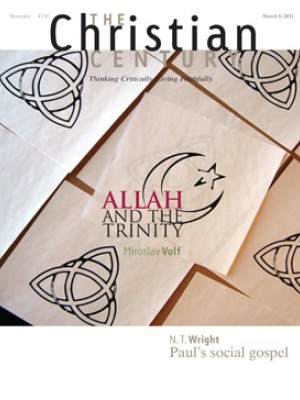Superstitious prayers
Recently I've been suffering a medical ailment. It's nothing life-threatening, but it's serious enough to have required multiple visits to doctors and nurses and even one trip to the emergency room.
On the trip to the emergency room I got ushered in to see the doctor within five minutes. Knowing that trips to the emergency room—if you aren't dying—usually mean long waits, I was considerably surprised at this and commented on my surprise to the nurse who led me out of the waiting room and into the inner sanctum. "OK, but watch out," she said. "No need to say anything more about it. We've got a good mojo working here tonight, and we don't want to jinx it."
Her remark reminded me of a friend who is a trained medical professional. Battling an intractable case of arthritis in one of her knees, she had resorted to putting a bar of soap in a sock, then sleeping with the socked soap next to her knee. She was confident this lessened the pain in her leg.
Read our latest issue or browse back issues.
Superstition—even in the field of medicine, that most modern and scientific of endeavors? Maybe I shouldn't be surprised. Superstition is also rife, for instance, in another high stakes and regularly unpredictable line of work, that of professional sports. I got to thinking about how persistent superstition is, how it is not confined to "primitive" backwaters but suffuses our contemporary culture.
In our highly pluralistic society, superstition is not easy to define. One person's superstition may be another person's religion. But for the sake of discussion, let's say that superstition is characterized by techniques and expectations that are not scientifically provable (or falsifiable) and apt to be regarded by many as irrational. Let's add that a superstition is a human attempt to control the uncontrollable, to manipulate chaos and produce a favorable outcome.
If that is the definition, Christians are not at all immune to superstition. In fact, when my ailment lingered for more than two weeks, I was tempted to pray superstitiously. I found myself wondering if I might get better if I asked more people to pray for me, or maybe if I asked the right person to pray for me. In other words, if I got the ritual just so, I'd be healed, the chaos would be tamed, the unpredictability—and my suffering—would end. That sounds a lot like a superstitious employment of prayer.
Which prompts a bigger question: Is prayer always and simply superstitious? Or is there a difference between faithful prayer and a ritualistic attempt to manipulate God?
Prayer is like superstition in admitting that there are powers bigger than us, powers over which we exercise little or no control. A world totally under human control would be a world without superstition, and it would probably be a world without prayer.
But faithful prayer differs from superstition in that it does not presume control. It petitions God, the power at the center of all that is, while it does not presume on God's "answer" or response. Faithful prayer is habitual prayer, prayer that does not occur only in crisis and does not end when a crisis is resolved. Faithful prayer is part and parcel of an ongoing relationship, a lifelong conversation, a prolonged attempt not to control God but to discern God's presence and activity in all that befalls us—the good and the bad, the desired and the undesirable. So there may be no atheists in foxholes, but prayers offered only in foxholes are superstitious prayers.
To put this another way, faithful prayer is first of all about finding and placing ourselves in God's story, and God's story is about the redemption of the world. My prayers are too small if they focus on me. Secondarily, though importantly, prayer is about our personal, individual needs and desires. If this is so, faithful prayer certainly may ask for healing, but it does not ask only for healing. It seeks wisdom to see how Christ is reflected in circumstances—and not just a triumphal Christ but a suffering Christ, a Christ who underwent pain and want before he attained glory. Faithful prayer, then, asks not merely for healing but for patience and discernment and continuing faithfulness.
By comparison, a superstitious act is easy and instantaneous. It doesn't take a lot of effort to toss salt over a shoulder or nail a horseshoe above a door. And we succumb or submit ourselves to superstitious behavior only when and so long as we think it will get us what we want, sooner or later, and preferably sooner.
As of this writing, I remain visited by my ailment. A successful and healing resolution, thank God, appears likely. Not imminently, though. At the least I will have to learn more about patience and humility, as well as my own very human vulnerability. If I could choose between prayer and superstition, I'm sometimes tempted to choose superstition. Faithful prayer is work and not always immediately satisfying. God give me—God give us—the strength not to submit to superstition but to continue in the work of true prayer, the very work for which we were made.








